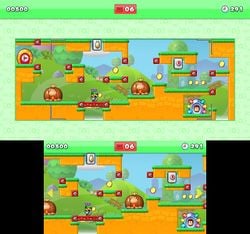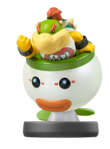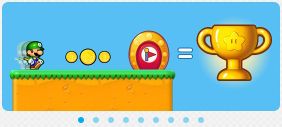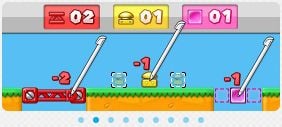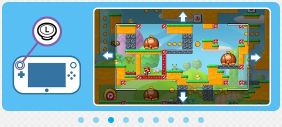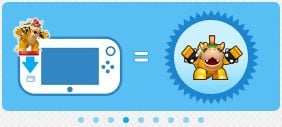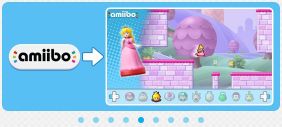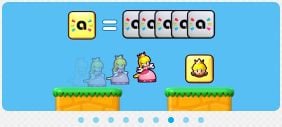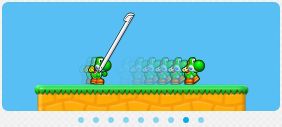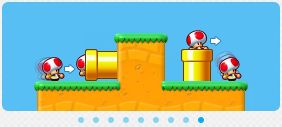Mini Mario & Friends: amiibo Challenge: Difference between revisions
(→Worlds) |
Tag: Reverted |
||
| Line 178: | Line 178: | ||
*''[[Super Mario 64]]'': Mini Peach's levels are based on her castle from this game, and use an arrangement of "Inside the Castle Walls" as the background music. In addition to this, Mini Bowser's levels use an arrangement of his battle theme from this game as the background music. Mini Mario's ability originated in this game. The [[Warp Pipe]] sound is the same as this game. | *''[[Super Mario 64]]'': Mini Peach's levels are based on her castle from this game, and use an arrangement of "Inside the Castle Walls" as the background music. In addition to this, Mini Bowser's levels use an arrangement of his battle theme from this game as the background music. Mini Mario's ability originated in this game. The [[Warp Pipe]] sound is the same as this game. | ||
*''[[Luigi's Mansion]]'': Mini Luigi's levels use an arrangement of this game's main theme as the background music. | *''[[Luigi's Mansion]]'': Mini Luigi's levels use an arrangement of this game's main theme as the background music. | ||
*''[[Mario & Luigi: Superstar Saga]]'': Luigi's jump sound during a high jump is very similar to the high jump sound from this game. | |||
*''[[Super Mario Galaxy]]'': Mini Rosalina's levels are based on this game, and are set in the [[Comet Observatory]]. The background music is an arrangement of the observatory and [[Baby Luma]]'s theme music. | *''[[Super Mario Galaxy]]'': Mini Rosalina's levels are based on this game, and are set in the [[Comet Observatory]]. The background music is an arrangement of the observatory and [[Baby Luma]]'s theme music. | ||
*''[[New Super Mario Bros. Wii]]'': Mini Mario's levels are based on this game, with the background resembling this game's [[World 1 (New Super Mario Bros. Wii)|World 1]]. Mini Bowser Jr.'s levels are based on this game's airship levels as well, and use an arrangement of Bowser Jr.'s battle theme as the background music. | *''[[New Super Mario Bros. Wii]]'': Mini Mario's levels are based on this game, with the background resembling this game's [[World 1 (New Super Mario Bros. Wii)|World 1]]. Mini Bowser Jr.'s levels are based on this game's airship levels as well, and use an arrangement of Bowser Jr.'s battle theme as the background music. | ||
Revision as of 14:08, September 20, 2023
| Mini Mario & Friends: amiibo Challenge | |||||||||
|---|---|---|---|---|---|---|---|---|---|
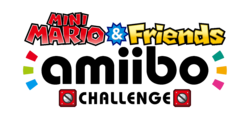 Official English logo For alternate box art, see the game's gallery. | |||||||||
| Developer | Nintendo Software Technology Corporation | ||||||||
| Publisher | Nintendo | ||||||||
| Platform(s) | Wii U Nintendo 3DS | ||||||||
| Release date | Template:Release | ||||||||
| Genre | Puzzle | ||||||||
| Rating(s) |
| ||||||||
| Mode(s) | Single-player | ||||||||
| Input | Wii U: Nintendo 3DS:
| ||||||||
Mini Mario & Friends: amiibo Challenge is a downloadable game for the Wii U and Nintendo 3DS systems. It was released in Japan on January 28, 2016, and was released in April 2016 internationally, making it the only installment so far in the Mario vs. Donkey Kong series to not be released in North America first. In the United States, it was available for early access between March 25, 2016 and April 27, 2016, with the purchase of any amiibo figure at Amazon, Best Buy, or GameStop. It is the seventh installment in the Mario vs. Donkey Kong series and the first to feature amiibo support.[1] New toys are featured in the game, such as Mini Rosalina, Mini Bowser, Mini Bowser Jr., Mini Yoshi, Mini Diddy Kong, and Mini Spek, while returning toys include Mini Mario, Mini Luigi, Mini Donkey Kong, Mini Peach, and Mini Toad.[2][3][4] The Wii U version of this title requires 318.6 MB to be installed, and the 3DS version requires 2,338 blocks. However, the game was later removed from the Wii U and 3DS eShop services after their discontinuation on March 27, 2023, making it no longer possible for players to purchase the game, but players who purchased the title before this date can still play it as long as any version is on their Wii U device, their 3DS device, or both.
Gameplay
The main game is largely similar to previous installments in the series, in that the player controls a Mini Toy trying to reach the end of the stage. By scanning a compatible Super Mario franchise-related amiibo, the player can receive the corresponding toy to play as, while the Mini Spek is received by scanning any other amiibo. Each Mini Toy (with the exception of the Mini Spek) has a special ability that allows it to clear stages easier. At the end of each stage, players are given a score based on their performance, and by clearing it with a high enough score, the player earns a Gold Trophy for that stage. Instead of a regular level selection screen like in previous games, the player now navigates a New Super Mario Bros.-styled map with the chosen Mini figure. Another difference is that the player only has to guide a single Mini to the end of each stage, unlike in other games where multiple had to be managed in order to complete a level.
Within certain main stages are amiibo Doors, which can only be accessed by the corresponding character on the door and unlock special stages themed around that character. Some stages also feature amiibo Tokens, which do not work in any other game and can only be obtained by using the abilities of the amiibo on the token.
Characters
Mini Toys
Unlike in previous games, each of the Mini Toys have their own unique special abilities corresponding to them.
| Character | Compatible amiibo | Ability |
|---|---|---|
 Mini Mario |
        
|
Wall Jump: Jump off a wall upon moving close to one. |
 Mini Luigi |
 
|
High Jump: Jump higher than other Mini Toys. |
 Mini Peach |
   
|
Floating Jump: Float over narrow gaps in the ground. |
 Mini Toad |
Small Crawl: Duck and pass through small openings. | |
 Mini Donkey Kong |
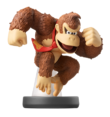   
|
Quick Climb: Climb up steep slopes. |
 Mini Bowser (new) |
    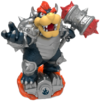
|
Bowser Bomb: If Mini Bowser falls from a cliff, he will stomp the ground, destroying any rocks in the way. |
 Mini Bowser Jr. (new) |
Spike Guard: Travel over spikes without getting hurt | |
 Mini Diddy Kong (new) |
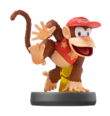 
|
Ledge Grab: If Mini Diddy Kong walks off a cliff, he will grab on to the ledge, instead of falling, and pull himself back up to safety. This won't work with ledges that are the same height as the fall. |
 Mini Yoshi (new) |
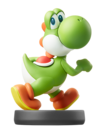  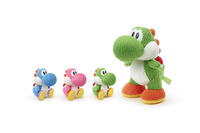
|
Eat Enemies: Eat small enemies. |
 Mini Rosalina (new) |
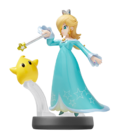 
|
Lunar Launch: Perform an exceptionally high jump next to high walls. |
 Mini Spek (new) |
Any figure besides those shown above. amiibo cards are unsupported. | None: Mini Spek doesn't have a special ability. |
Enemies
Worlds
In addition to the main stages in the game, there are also worlds themed around each character toy that can be unlocked by clearing certain stages via an amiibo Door, which can only be accessed by using the amiibo that corresponds with the character's icon shown on it.[5]
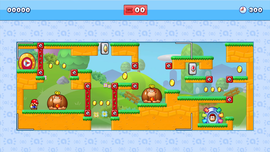
|
Main Main Levels These levels are meant to introduce the player to a new concept and are seen before the character-exclusive worlds. Levels Level 1 • Level 2 • Level 3 • Level 4 • Level 5 • Level 6 • Level 7 • Level 8 • Level 9 • Level 10 • Level 11 • Level 12 |
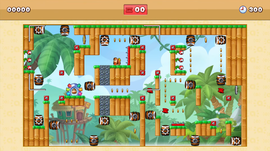
|
World 1 Barrel Blast Jungle Mini Donkey Kong's world, based on Donkey Kong Country Returns. Its main mechanic is Barrel Cannons. The music that plays is a cover of the Jungle Hijinxs theme from Donkey Kong Country. Levels Donkey Kong 1 • Donkey Kong 2 • Donkey Kong 3 • Donkey Kong 4 |
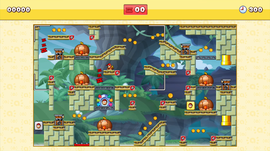
|
World 2 Mine Cart Cove Mini Diddy Kong's world, based on the ruins levels from Donkey Kong Country Returns. Its main mechanic are Mine Carts. The music that plays is a cover of the Bonus Area theme from Donkey Kong Country. Levels Diddy Kong 1 • Diddy Kong 2 • Diddy Kong 3 • Diddy Kong 4 |
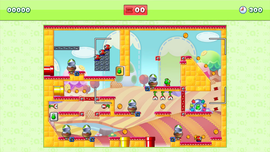
|
World 3 Egg Launch Land Mini Yoshi's world, based on Yoshi's Woolly World. Its main mechanic are Yoshi Eggs that Mini Yoshi can ride in and can ricochet off walls after launching them. The music that plays is a cover of the main overworld theme from Super Mario World 2: Yoshi's Island. Levels Yoshi 1 • Yoshi 2 • Yoshi 3 • Yoshi 4 |
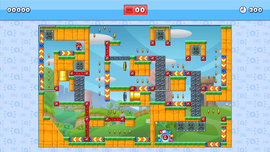
|
World 4 Boost Pad Bonanza Mini Mario's world, based on New Super Mario Bros. Wii. Its main mechanic is Boost Pads. The music that plays is the same cover of Super Mario Bros. 2's overworld theme heard in previous installments. Levels Mario 1 • Mario 2 • Mario 3 • Mario 4 |
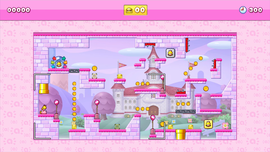
|
World 5 Balloon Float Castle Mini Peach's world whose mechanic are balloons that fly in the direction of the arrow once Mini Peach grabs onto one. The music that plays is the Peach's castle theme from Super Mario 64. Levels Peach 1 • Peach 2 • Peach 3 • Peach 4 |
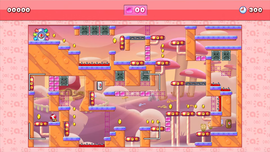
|
World 6 Mushroom Hills Mini Toad's world. The main mechanic of these stages are Bouncy Mushrooms that can be used to bounce the Mini Toy. The music that plays is Winding Ravine's music from the previous game. Levels Toad 1 • Toad 2 • Toad 3 • Toad 4 |
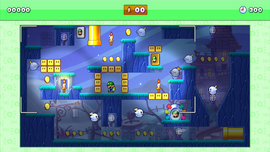
|
World 7 Moonlight Mansion Mini Luigi's world, based on the Luigi's Mansion games. Its main mechanic is candles that can be removed and placed in different spots to stun the Boos and reveal hidden blocks that can be passed through without a torch, but cannot be passed through with one. The music that plays is a cover of the mansion theme of Luigi's Mansion. Levels Luigi 1 • Luigi 2 • Luigi 3 • Luigi 4 |
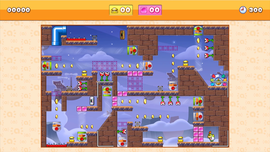
|
World 8 Air Tumble Rumble Mini Bowser Jr.'s world in which the main gimmick is fans that push the player across gaps, which alternate between turning on and off by tapping them. The music that plays is a cover of Bowser Jr.'s battle theme in New Super Mario Bros. Wii. Levels Bowser Jr. 1 • Bowser Jr. 2 • Bowser Jr. 3 • Bowser Jr. 4 |
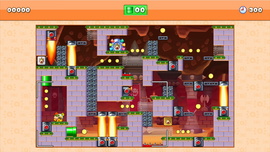
|
World 9 Fire Ride Fortress Mini Bowser's world, based on Bowser's Castle. Its main mechanic are Fire Blocks. The music that plays is an arrangement of Bowser's theme from Super Mario 64. Levels Bowser 1 • Bowser 2 • Bowser 3 • Bowser 4 |
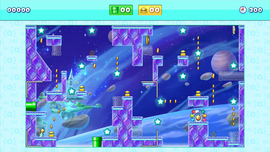
|
World 10 Gravity Galaxy Mini Rosalina's world, a space-themed world, with the Comet Observatory in the background. The music that plays is a cover of both the Comet Observatory and Baby Luma's themes from Super Mario Galaxy. The main mechanic of this world are Gravity Wells. Levels Rosalina 1 • Rosalina 2 • Rosalina 3 • Rosalina 4 |
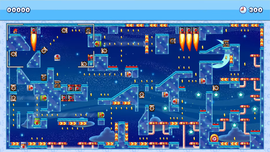
|
World 11 Star World The final world, unlocked after clearing all of the main stages. Stages in this world can only be unlocked by collecting amiibo Tokens. Levels Star 1 • Star 2 • Star 3 • Star 4 • Star 5 • Star 6 • Star 7 • Star 8 • Star 9 • Star 10 • Star 11 |
The player can open a help menu by tapping on a question mark icon at the bottom right of the map screen. The help menu serves the same purpose as the Help Mode from previous installments, in that the player can use it to view tips related to gameplay. In addition, the player can access a sequence with the game's credits.
In the 3DS version of the game, the bottom screen numbers each of the tips and provides a name for each. Compared to the Wii U version, in the 3DS version the equal signs and the arrows shown in various tips are of a dark shade of blue instead of white, the "Scrolling" tip shows a 3DS instead of a Wii U Gamepad, with the picture of the level even differentiating slightly, and the "Tap to Run" tip shows a 3DS stylus instead of the Wii U stylus. The fourth tip in the Wii U version showing that the Mini Toy can be swapped by scanning another amiibo is not in the 3DS version, though its description is merged into the one of the following tip, which is the fifth tip in the Wii U version, but tip 4 in the 3DS version. This means that the Wii U version has 9 tips while the 3DS version has 8.
The table below lists all tips offered in the help menu, along with the pictures that accompany them in-game. These tips also appear in this order on loading screens in the Wii U version. The 3DS version has no loading screens, so the tips can only be seen through its menu in the map screen.
References to other games
- Donkey Kong: Like in past games, the hammer appears, with the classic theme music.
- Super Mario Bros. 2: Some of Mini Mario's levels use an arrangement of the main level theme from this game.[6] Mini Luigi and Mini Peach's abilities originated in this game.
- Super Mario Bros. 3: Star Road's level music is an arrangement of the athletic theme from this game. Mini Bowser's ability originated in this game.
- Super Mario World: The final world is based on the Star World from this game[7], and features an arrangement of its song on the world map. Mini Yoshi's ability originated in this game.
- Donkey Kong Country: Donkey Kong and Diddy Kong's levels feature arrangements of "DK Island Swing" and the Bonus Area theme as background music, respectively.
- Super Mario World 2: Yoshi's Island: Mini Yoshi's levels are based on this game, and use an arrangement of the game's overworld theme as the background music.
- Super Mario 64: Mini Peach's levels are based on her castle from this game, and use an arrangement of "Inside the Castle Walls" as the background music. In addition to this, Mini Bowser's levels use an arrangement of his battle theme from this game as the background music. Mini Mario's ability originated in this game. The Warp Pipe sound is the same as this game.
- Luigi's Mansion: Mini Luigi's levels use an arrangement of this game's main theme as the background music.
- Mario & Luigi: Superstar Saga: Luigi's jump sound during a high jump is very similar to the high jump sound from this game.
- Super Mario Galaxy: Mini Rosalina's levels are based on this game, and are set in the Comet Observatory. The background music is an arrangement of the observatory and Baby Luma's theme music.
- New Super Mario Bros. Wii: Mini Mario's levels are based on this game, with the background resembling this game's World 1. Mini Bowser Jr.'s levels are based on this game's airship levels as well, and use an arrangement of Bowser Jr.'s battle theme as the background music.
- Mario vs. Donkey Kong: Mini-Land Mayhem!: The music that plays in night-themed main levels (Level 7 onward) is a variation of the music of Area 3-DK from this game.
- Donkey Kong Country Returns: Mini Donkey Kong and Mini Diddy Kong have levels based on this game, featuring DK's treehouse and mine carts in this game's art style.
- Luigi's Mansion: Dark Moon: Mini Luigi's levels seem to be based outside of Gloomy Manor from this game, since it's seen in the background and on the world map.
- Yoshi's Woolly World: The background of Mini Yoshi's levels is based on this game.
Nintendo 3DS eShop description
- American English version
Make minis march like never before in this free download. Tap an amiibo™ figure to guide 1 of 11 minis across more than 50 levels. Use minis and their unique abilities, like Yoshi™ who can eat enemies or Rosalina who launches to high places, to reach the exit. But watch out! Mine carts, ghostly Boos and other new obstacles lurk around every corner. To get started, simply tap any compatible amiibo figure. Or, by tapping specific amiibo figures, you can guide minis that have their own unique abilities and exclusive set of levels. These specially designed, character-themed levels include their own look, remixed music and obstacles for you to master, which comes in handy the more you play. Earn in-game amiibo tokens with different minis to unlock even more difficult challenges.
- British English version
Mini Mario & Friends: amiibo Challenge is based on the Mario vs. Donkey Kong series. Enjoy this fast-paced puzzle game where you can manipulate the environment with the Touch Screen to safely guide your character past various environmental hazards and enemies to the level exit. If you have an amiibo (sold separately), you can play ingenious puzzles that require super-quick wits and fast reflexes to beat. Your aim is to guide the clockwork Mini Toys towards the Goal Door in each stage, using the Nintendo 3DS Touch Screen to position all sorts of items, such as Girders, lifts and springs to help them on their way. Mini Toys will keep on moving automatically, so plan the safest route possible and use every tool at your disposal to stop them from falling into traps - or into the clutches of enemies!
Promotion
The Play Nintendo website features a skill quiz on the subject of Mini Mario & Friends: amiibo Challenge.
Reception
| Reviews | |||
|---|---|---|---|
| Release | Reviewer, Publication | Score | Comment |
| Wii U | Shanker Varma, Cubed3 | 8/10 | "Anyone with an amiibo should download this to try it out, especially if he or she enjoys puzzle games and/or Mario vs. Donkey Kong: Tipping Stars. Everything has been created with the same care that is found in other Nintendo titles and each of the abilities gives their collectible counterparts probably their best use yet. The mission to get gold trophies means that even the most hardened gamers will find a challenge, while those looking for a more relaxing time can complete each stage at their own pace. This makes it accessible to a range of people, as skill isn't an immediate barrier to enjoyment. The only real barrier is the cost of amiibo, but it could be enough to tip those who were interested in buying one over the edge. Anyone who already has a sizeable collection is sure to relish the extra content that is now available for no additional charge." |
| Wii U | Thomas Whitehead, Nintendo Life | 7/10 | "As a free app that provides an incentive to explore amiibo, Mini Mario & Friends: amiibo Challenge is a good effort. It offers a nice taster for those with non-Mario-themed toys, with 12 levels to tackle, and adds enjoyable twists and extra content for those with the correct figures. It's a fun if not premium experience, with some rather uninspired level designs mixed in with moments of greater quality - for amiibo fans it's well worth a look." |
| Aggregators | |||
| Compiler | Platform / Score | ||
| GameRankings | 70.00% | ||
Gallery
- For this subject's image gallery, see Gallery:Mini Mario & Friends: amiibo Challenge.
Media
- For a complete list of media for this subject, see List of Mini Mario & Friends: amiibo Challenge media.
Staff
- Main article: List of Mini Mario & Friends: amiibo Challenge staff
Names in other languages
| Language | Name | Meaning | Notes |
|---|---|---|---|
| Japanese | ミニマリオ & フレンズ amiiboチャレンジ[?] Mini Mario ando Furenzu Amiibo Charenji |
Mini Mario and Friends: amiibo Challenge |
References
- ^ https://twitter.com/GameXplain/status/687107258824654848
- ^ http://www.youtube.com/watch?v=-ESC_Se-Tmg&t=0m35s
- ^ https://www.nintendo.co.jp/wiiu/ap5j/chara/index.html
- ^ http://nintendoeverything.com/mini-mario-friends-amiibo-challenge-coming-to-wii-u-and-3ds/
- ^ NintenDaan. (January 30, 2016). [Mini Mario & Friends: aC] Wii U First Look. YouTube. Retrieved February 24, 2016.
- ^ アルス(liaoallen). (February 26th 2016). ミニマリオ&フレンズ amiiboチャレンジ part4 マリオ編. YouTube. Retrieved February 26th 2016.
- ^ アルス(liaoallen). (March 6, 2016). ミニマリオ&フレンズ amiiboチャレンジ part11 スターワールド上編. YouTube. Retrieved March 6, 2016.
